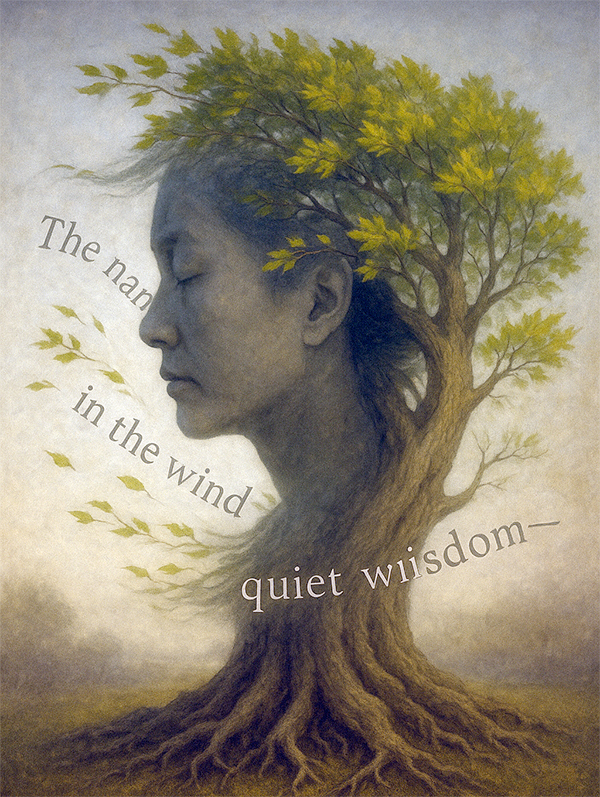风里的名字,根下的归处
来芳讲道 · 第五讲
风里的名字,根下的归处
Laifang on the Way · Lecture 5
The Name in the Wind, the Home Beneath the Roots
我们今天,从一个古老的字说起:省。
Let us begin with an ancient word: Shěng — restraint, reflection, awareness.
在中国人的文化基因中,
它是一个做人的标准。
Within the cultural DNA of the Chinese people,
it stands as a standard for how one lives.
它有多重含义——节俭、节制、自省、反省,
每一层含义,都指向一种内在秩序的觉醒。
It means thrift, self-discipline, and above all, inward awakening.
省,是节俭,但不止于节俭。
Restraint is thrift, but not merely thrift.
它不是吝啬,而是对万物有分寸的尊重;
不是克制欲望的贫瘠,而是懂得什么是真正的丰盛。
It is not miserliness, but a reverence for all things—
not the barrenness of repression, but a deep sense of what is truly abundant.
省,是节制,是清醒的自由。
It is self-regulation—a form of conscious freedom.
在诱惑面前,不迷失;在富足面前,不膨胀。
In the face of temptation, it remains grounded;
in the face of abundance, it stays humble.
它是对自己力量的守护,而不是限制。
It protects strength from within, rather than suppresses it.
省,是觉,是照见内心的能力。
Restraint is also awakening—the power to illuminate the heart.
不是事后反思,而是当下察觉;
是一边前行,一边回望;
是一边拥有,一边放下。
Not reflection after the fact,
but mindfulness in the moment—
movement forward with awareness,
holding on with grace, and letting go with peace.
省的目的,不是节约什么,
而是为了成就一种更长久的生命形态。
The purpose of restraint is not mere saving,
but to build a life that endures.
长久,是我们真正所追求的目标。
Longevity—in all forms—is what we truly seek.
社会希望长治久安,
人希望长生久视。
Society longs for lasting peace and order;
the individual longs for life that is full and far-seeing.
而“省”,正是这个目标被唤醒之后,在生活中的回应。
And restraint is how that awakened goal lives through daily practice.

省,是对长久之道的深知而自持,
是不动声色地,为未来留出空间,
为根基打下时间。
It is a quiet wisdom—
making space for the future,
laying time into the roots.
老一辈人,正是从“省”开始的。
Our elders began with restraint.
他们不讲道理,却把“道”活在日常里。
They didn’t speak of the Way—
they simply lived it.
他们教会我们:
会省,就不会贫瘠;知足,方能生根。
They taught us:
He who knows restraint will never be impoverished.
He who knows contentment can always take root.
总理的一生,
简朴而从容,清廉而自持。
Premier Zhou lived a life
simple yet composed, upright yet self-contained.
他时时自省,忧人民之忧,思国家之计。
He constantly reflected, bore the people’s burdens,
and thought for the nation’s future.
但他从不宣讲“省”,
他是把它活在生活里:
He never preached restraint—
he lived it:
省的是权力的欲望,
省的是言语的分寸,
省的是情感的流露,
只为把更多的空间,留给人民和时代。
He restrained his own desire for power,
measured every word,
tempered every emotion—
to leave more space for the people and the times.
小时候,我并不懂“省”的真正含义,
只知道长辈们日子过得简单,却有分寸、有尊严。
As a child, I didn’t grasp the meaning of restraint—
I just saw how my elders lived simply,
with dignity and discipline.
他们从不浪费,也从不抱怨;
一双旧鞋、一张饭桌、一盏灯,
都被安静而认真地对待。
They wasted nothing, complained little;
an old pair of shoes, a dining table, a lamp—
all were treated with quiet care.
长大以后我才明白,
他们不是“过苦日子”,
而是在用“省”与世界保持距离,
在纷扰的世界中,守住一块无法被侵蚀的空间。
Later I realized,
they weren’t “living poorly”—
they were keeping distance from excess,
preserving within the chaos a space that could not be corroded.
如今我们谈可持续、讲低碳、说生态,
其实,道早已藏在他们的生活里。
Today we speak of sustainability, low carbon, and ecology—
but the Way has long been hidden in their way of living.
而总理,就是那个把道走得最深、最远的人。
And Premier Zhou was the one who walked that Way the deepest and the furthest.
他的名字,不只是历史里的一笔,
而是风里的一道印记。
His name isn’t just a line in history—
it’s a mark carried in the wind.
在这个世界感到迷茫的时候,
他的名字,不仅给予我们力量,
更像一座灯塔,照亮前行的方向。
When the world feels lost,
his name not only gives us strength,
but stands like a lighthouse, lighting the way ahead.
 风里的名字,是提醒。
风里的名字,是提醒。
根下的归处,是回响。
The name in the wind is a reminder.
The home beneath the roots is its echo.
一个人,若能记住自己的名字,
就不会失去方向;
一个民族,若能记住那些曾以“省”行道的人,
就不会忘记根在哪里。
A person who remembers their name will not lose their way.
A people who remember those who lived the Way through restraint
will never forget where their roots lie.
来芳曰|Laifang’s Note
名字,是被风呼唤过的誓言,
而“省”,是那条通往归处的路。
愿我们每一个人,在时代的风中,
都能听见那个名字,走向那片根下的光。
A name is a vow once called into the wind.
“Restraint” is the road that leads home.
May each of us, in the winds of our time,
hear that name—and walk toward the light beneath our roots.


